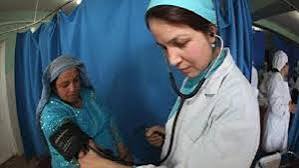The remote parts of Afghanistan are facing a severe shortage of midwives

Yes, the remote parts of Afghanistan are facing a severe shortage of midwives and health workers. This problem has many negative effects on the health of mothers and babies in these areas. Some of the reasons for this deficiency are:
-
Lack of educational facilities and training of specialized forces: In many remote areas, educational facilities for training midwives and other health personnel are limited. The lack of educational institutions and the lack of access to advanced training make there are not enough midwives and specialists in these areas.
-
Security problems: Insecurity and war in Afghanistan have caused many remote areas to have no access to health services. Midwives and other health workers refuse to work in these areas due to security risks.
-
Lack of health facilities and infrastructure: The lack of hospitals, clinics and proper health facilities in remote areas limits health services. This lack of infrastructure means that even if there are midwives, they cannot provide the necessary services properly.
-
Poverty and economic problems: Many remote areas are facing extreme poverty. This issue causes families to not have the financial ability to pay health expenses and as a result do not have access to the services of midwives.
-
Culture and traditions: In some areas, local traditions and cultures can prevent women from accessing health services and midwives. For example, some families may refuse to go to health centers due to cultural and social concerns.
Improving the health situation in remote areas of Afghanistan requires special attention of the government and international organizations. This includes increasing investment in the education and training of midwives, improving health infrastructure, providing security for health workers, and promoting health awareness in the community.

The lack of midwives in Afghanistan has led to an increase in maternal mortality
The lack of midwives in Afghanistan has directly increased maternal mortality. Limited access to appropriate and specialized health services during pregnancy and childbirth is one of the main factors of this problem. The following factors have contributed to the aggravation of this situation:
-
Limited access to health services: Many women in remote and rural areas do not have access to proper health centers and trained midwives. This issue leads to deliveries without medical supervision and increased risks for mothers and babies.
-
Lack of specialist personnel: There is not enough number of midwives and obstetricians in the country. This deficiency causes many pregnant women to give birth without proper medical supervision.
-
Poverty and lack of financial facilities: Many families do not have the financial ability to pay for health services due to poverty. This issue makes pregnant women unable to go to health centers and receive the necessary services.
-
Security problems: Insecurity and war in Afghanistan have caused many remote and rural areas to not have access to health services. These security conditions also make midwives and doctors refuse to work in these areas.
-
Lack of education and training: The education and training system of midwives and health professionals is not developed enough. The lack of suitable training programs for the training of specialized personnel means that a sufficient number of midwives is not available.
-
Traditions and cultures: Some cultural traditions and beliefs may prevent women from visiting health centers. In turn, this issue affects the increase in maternal mortality.
To reduce maternal mortality in Afghanistan, immediate and effective measures are needed by the government and international organizations. These measures can include increasing investment in training and education of midwives, improving health infrastructure, providing security for health workers, and promoting health awareness in the community.
